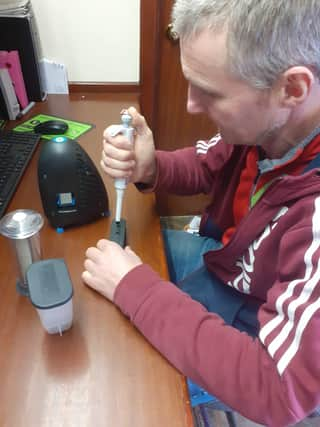Anthelmintic Resistance webinar attracts a large attendance


Over 165 were in attendance on the night to hear the outcomes of the Anthelmintic TST EIP project to date.
A recording of the webinar is now available to view on the AgriSearch YouTube page for those that weren’t able to attend.
Advertisement
Advertisement
Jason Rankin (AgriSearch) chaired the event giving a brief overview of the EIP projects aims and objectives and introducing the excellent line-up of speakers. Dr Sam Strain (AHWNI) kicked off proceedings by setting the scene for attendees with regards the constraints parasites pose to production. Parasites are ever present in the animal and in their environment and the cost to production efficiency is enormous but worryingly resistance to anthelmintic is widespread and worsening. The route to anthelmintic resistance (AR) was explained and the question of how it can be prevented posed.
Professor Eric Morgan followed this introduction by looking into the question of anthelmintic resistance prevention. Whilst anthelmintic wormer resistance is inevitable the rate at which it happens can be influenced – for example via the principles of targeted selective treatment and targeted treatment. Both methods generate refugia – a concept well explained by Eric on the night. Whilst the concept is simple however carrying it out on farm without risking production loss can be can be more complex.
The Anthelmintic TST Project led by AgriSearch, has been addressing this issue by trialling TST/TT methods on Northern Ireland ruminant livestock farms to determine the overall impact and feasibility. The EIP project group is comprised of three beef farmers, two dairy farmers, two sheep farmers with technical input from Queen’s University, AFBI and AHWNI and is jointly funded by the European Agricultural Fund for Rural Development (EAFRD) and the Department of Agriculture, Environmental and Rural Affairs (DAERA).
Dr Chris McFarland presented the results of the first year of the EIP project highlighting how suitable strategies were selected for each farm, the measurements taken on farm and the impact on anthelmintic use over a full grazing season. Examples of how the information collected allowed informed decisions to be made on farm were shown as well as an overview of impact on treatments on each participant farm.
Advertisement
Advertisement
Last but not least two of the farmer participants in the EIP project Ian McClelland (Dairy) and Martin Craig (Beef and Sheep) explained why they got involved in the project, how they have found carrying out the TST/TT process and what were the challenges/benefits for their farm. A question and answer allowed for audience interaction with the evening’s speakers with an excellent range of questions posed.
It is encouraging to see the level of interest in this topic area and for anyone looking to take practical steps on farm to minimise Anthelmintic Resistance the following basic steps can easily be taken; treat only when necessary, use the right products at the right dose and check that it works, ensure refugia are in place.